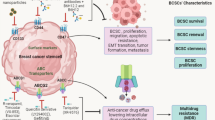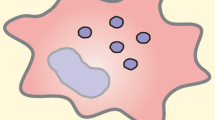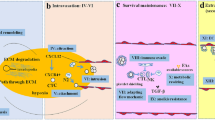Abstract
Purpose: Dendritic cells (DCs) play an important role in the host’s immunosurveillance against cancer. It has been shown that the function of DCs is impaired and their population decreased in a cancer-bearing host. In the present study, we investigated the mechanism of down-regulation of DCs in a cancer-bearing host. Methods: We evaluated the relationship between DC infiltration and production of vascular endothelial growth factor (VEGF) in carcinoma tissue by immunohistochemistry. Furthermore, functional and phenotypical alterations of DCs were evaluated when monocyte-derived, mature DCs were treated with VEGF in vitro. Monocyte-derived DCs were generated in a culture of monocyte with interleukin 4 (IL-4) and granulocyte-macrophage colony-stimulating factor, and the maturation of DCs was induced by either lipopolysaccharide (LPS) or a proinflammatory cytokine cocktail: tumor-necrosis factor α, prostaglandin E2, IL-6, and IL-1β. Results: A significant inverse correlation was found between the density of DCs and the quantity of VEGF production in gastric carcinoma tissue (r=−0.39, p<0.05). In LPS-induced maturation, the ability of mature DCs to stimulate allogenic T cells and produce IL-12 (p70 heterodimer) was suppressed by the addition of VEGF in a dose-dependent manner. A lesser expression of costimulatory molecules (CD80 and CD86) was seen in DCs treated with exogenous VEGF than in DCs not treated with VEGF. The population of dead DCs (early and late apoptosis) treated with VEGF increased more than that without VEGF treatment, using the annexin V and propidium iodide evaluation in DCs matured by LPS. In contrast, in DCs matured by the proinflammatory cytokine cocktail, the down-regulation of costimulatory molecules and induction of DC apoptosis was not seen. Conclusions: These findings show that the inhibition of DC maturation by VEGF differs depending on the maturation status of the DCs.








Similar content being viewed by others
Abbreviations
- APC:
-
antigen-presenting cells
- DC:
-
dendritic cells
- ELISA:
-
enzyme-linked immunosorbent assay
- FACS:
-
fluorescence-activated cell sorter
- FCS:
-
fetal calf serum
- FITC:
-
fluorescein isothiocyanate
- GM-CSF:
-
granulocyte-macrophage colony-stimulating factor
- HLA:
-
human leukocyte antigen
- IL:
-
interleukin
- LPS:
-
lipopolysaccharide
- mAb:
-
monoclonal antibody
- MHC:
-
major histocompatibility complex
- PBS:
-
phosphate-buffered saline
- PCNA:
-
proliferative cell nuclear antigen
- PE:
-
phycoerythrin
- PG:
-
prostaglandin
- PI:
-
propidium iodide
- TNF:
-
tumor-necrosis factor
- VEGF:
-
vascular endothelial growth factor
References
Choux P, Favre N, Martin M, Martin F (1997) Tumor-infiltrating dendritic cells are defective in their antigen-presenting function and inducible B7 expression in rats. Int J Cancer 72:619
Gabrilovich DI, Corak J, Ciernik IF, Kavanaugh D, Carbone DP (1997) Decreased antigen presentation by dendritic cells in patients with breast cancer. Clin Cancer Res 3:483
Enk AH, Jonuleit H, Saloga J, Knop J (1997) Dendritic cells as mediators of tumor-induced tolerance in metastatic melanoma Int J Cancer 73:309
Almand B, Resser JB, Lindman B, Nadarf S, Clark JI, Kwon ED, Carbone DP, Gabrilovich DI (2000) Clinical significance of defective dendritic cell differentiation in cancer. Clin Cancer Res 6:1755
Tsujitani S, Furukawa T, Tamada R, Okamura T, Yasumoto K, Sugimachi K (1987) Langerhans cells and prognosis in patients with gastric cancer. Cancer 59:501
Furukawa T, Watanabe S, Kodama T, Sato Y, Shimosato Y, Suemasu K (1985) T-zone histiocytes in adenocarcinoma of the lung in relation to postoperative prognosis. Cancer 56:2651
Ambe K, Mori M, Enjoji M (1989) S-100 protein-positive dendritic cells in colorectal adenocarcinomas. Cancer 63:496
Matsuda H, Mori M, Tsujitani S, Ohno S, Kuwano H, Sugimachi K (1990) Immunohistochemical evaluation of squamous cell carcinoma antigen and S-100 protein-positive cells in human esophageal tissues. Cancer 65:2261
Nakano T, Oka K, Arai T, Morita S, Tsunemoto H (1989) Prognostic significance of Langerhans’ cell infiltration in radiation therapy for squamous cell carcinoma of the uterine cervix. Arch Pathol Lab Med 113:507
Leung DW, Cachianes G, Kuang WJ, Goeddel DV, Ferrara N (1989) Vascular endothelial growth factor is a secreted angiogenic mitogen. Science 246:1306
Connolly DT, Heuvelman DM, Nelson R, Olander JV, Eppley BL, Delfino JJ, Siegel NR, Leimgruber RM, Feder J (1989) Tumor vascular permeability factor stimulates endothelial cell growth and angiogenesis. J Clin Invest 84:1470
Kaya M, Wada T, Akatsuka T, Kawaguchi S, Nagoya S, Shindoh M, Higashino F, Mezawa F, Okada F, Ishii S (2000) Vascular endothelial growth factor expression in untreated osteosarcoma is predictive of pulmonary metastasis and poor prognosis. Clin Cancer Res 6:572
Saito H, Tsujitani S, Ikeguchi M, Maeta M, Kaibara N (1998) Relationship between the expression of vascular endothelial growth factor and the density of dendritic cells in gastric adenocarcinoma tissue. Br J Cancer 78:1573
Miyake M, Taki T, Hitomi S, Hakomori S (1992) Correlation of expression of H/Le(y)/Le(b) antigens with survival in patients with carcinoma of the lung. N Engl J Med 327:14
Gabrilovich DI, Chen HL, Girgis KR, Cunningham HT, Meny GM, Nadaf S, Kavanaugh D, Carbone DP (1996) Production of vascular endothelial growth factor by human tumors inhibits the functional maturation of dendritic cells. Nat Med 2:1096
Gabrilovich DI, Ishida T, Oyama T, Ran S, Kravtsov V, Nadaf S, Carbone DP (1998) Vascular endothelial growth factor inhibits the development of dendritic cells and dramatically affects the differentiation of multiple hematopoietic lineages in vivo. Blood 92:4150
Oyama T, Ran S, Ishida T, Nadaf S, Kerr L, Carbone DP, Gabrilovich DI (1998) Vascular endothelial growth factor affects dendritic cell maturation through the inhibition of nuclear factor-κB activation in hematopoietic progenitor cells. J Immunol 160:1224
Ishida T, Oyama T, Carbone DP, Gabrilovich DI (1998) Defective function of Langerhans cells in tumor-bearing animals is the result of defective maturation from hematopoietic progenitors. J Immunol 161:4842
Takahashi A, Kono K, Itakura J, Amemiya H, Tang RF, Iizuka H, Fujii H, Matsumoto Y (2002) Correlation of vascular endothelial growth factor-C expression with tumor-infiltrating dendritic cells in gastric cancer. Oncology 62:121
Zhou LJ, Tedder TF (1996) CD14+ blood monocytes can differentiate into functionally mature CD83+ dendritic cells. Proc Natl Acad Sci U S A 93:2588
Dhodapkar KM, Krasovsky J, Williamson B, Dhodapkar MV (2002) Antitumor monoclonal antibodies enhance cross-presentation of cellular antigens and the generation of myeloma-specific killer T cells by dendritic cells. J Exp Med 195:125
Takahashi A, Kono K, Amemiya H, Iizuka H, Fujii H, Matsumoto Y (2001) Elevated caspase activity in peripheral blood T cells coexists with increased degree of T-cell apoptosis and down-regulation of TCRζmolecules in patients with gastric cancer. Clin Cancer Res 7:74
Tsujitani S, Kakeji Y, Watanabe A, Kohnoe S, Maehara Y, Sugimachi K (1990) Infiltration of dendritic cells in relation to tumor invasion and lymph node metastasis in human gastric cancer. Cancer 66:2012
Maehara Y, Tomisaki S, Oda S, Kakeji Y, Tsujitani S, Ichiyoshi Y, Akazawa K, Sugimachi K (1997) Lymph node metastasis and relation to tumour growth potential and local immune response in advanced gastric cancer. Int J Cancer 74:224
Kiertscher SM, Luo J, Dubinett SM, Roth MD (2000) Tumors promote althered maturation and early apoptosis of monocyte-derived dendritic cells. J Immunol 164:1269
Ohm JE, Carbone DP (2001) VEGF as a mediator of tumor-associated immunodeficiency. Immunol Res 23:263
Author information
Authors and Affiliations
Corresponding author
Additional information
This work was supported by grants from the Ministry of Education, Culture, Sports, Science and Technology in Japan.
Rights and permissions
About this article
Cite this article
Takahashi, A., Kono, K., Ichihara, F. et al. Vascular endothelial growth factor inhibits maturation of dendritic cells induced by lipopolysaccharide, but not by proinflammatory cytokines. Cancer Immunol Immunother 53, 543–550 (2004). https://doi.org/10.1007/s00262-003-0466-8
Received:
Accepted:
Published:
Issue Date:
DOI: https://doi.org/10.1007/s00262-003-0466-8




